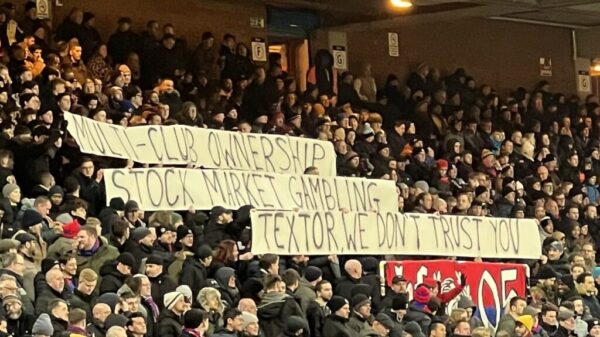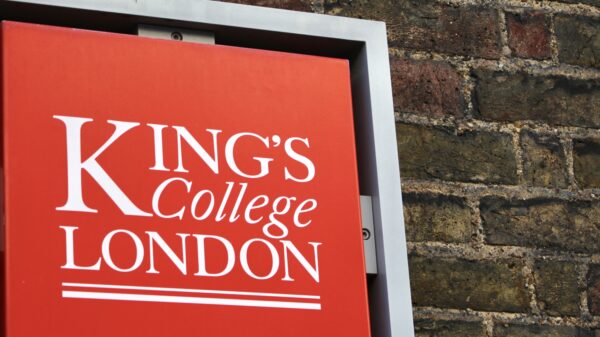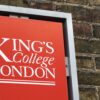KCL Politics and KCL American Politics society co-hosted the ‘US-EU relations talk’ on Thursday 12 October in the Edmond J Safra Theatre, with guest speakers Dr Laderman, Dr Leoni, and Dr Jones.
The event involved a panel discussion between the academics, hosted by representatives of both the KCL American Politics and the KCL Politics Society, before allowing members of the audience to ask the academics questions, centred around United States (US) and European Union (EU) approaches to foreign policy and diplomacy. The event featured a panel of three guests: Dr Charlie Laderman, a senior lecturer in International History at King’s College London (KCL), whose research focuses on the United States; Dr Zeno Leoni, a lecturer in Defence Studies at KCL, who is also an Affiliate of the KCL’s Lau China Institute KCL and Dr Ben Jones, a teaching fellow in European Foreign Policy at KCL.
Beginning with the topic of China, the focus of the discussion was the difficulty for the EU in striking a balance between the major economies of the US and China. Dr Jones noted that the EU faced the danger of either entrapment, being stuck between the two powers, or abandonment, the US abandoning the EU. Dr Leoni noted that it was difficult for any country to have a clear China strategy.
Greeted with a few late arrivals to the half-full lecture theatre, the panel shifted onto the topic of Ukraine. Here, Dr Charlie Laderman made a striking comparison with 1941, noting that the same debate on the extent to which the US should intervene in Europe, and the wider world, was occurring in the US today. He made one of the most striking statements of the event, saying that he thought that the idea of a Cold War 2.0 was “too optimistic.” Dr Jones emphasised the major shift for both Germany and France in foreign policy, including both Germany’s increased focus on defence and France’s shift away from a Gaullist ‘third way’ tradition. He stressed that there was “transatlantic cohesion” on the issue of Ukraine between the US and EU. Yet, he warned the audience of a creeping “weariness” with supporting Ukraine that could set in. Dr Leoni added to this, pointing out that there was much disagreement on the issue of Ukraine in Italy.
The panel then focused on the key changes and continuities in the US-EU relationship. Dr Jones noted the dominance of the US. He emphasised that the EU, when faced with American foreign policy that it disagreed with, could do little but remain in the background, highlighting Libya as a key example. He further stated that there was “striking continuity” in the transatlantic relationship. Dr Laderman zoned in on US domestic politics and the potential next president of the United States. Laderman stressed that Trump’s foreign policy stance was “less of an aberration than we might think”, and that it was rooted in “deep seated trends”, that could be seen throughout US history. Laderman highlighted how Europe had got used to US involvement when the past demonstrated that it should be more cautious.
Halfway through the event, the floor was opened up to questions. The first question was on if Trump could win, and what this would mean. Laderman suggested that this was indeed very possible, noting that he had recently seen a poll putting Trump ten points ahead of Biden in the swing state of Ohio. Following this, the focus once more shifted onto the security relationship between Europe and the US, and Trump’s potential effect upon this. Dr Jones drew attention to the fact that the US Congress had passed legislation making it much more difficult for the President to leave NATO, but stressed that the issue of Ukraine was a “delicate balance”. Dr Laderman stated that Trump posed a “huge uncertainty”, something he added was quite antithetical to the strength of Article 5 of NATO; which, he added, which rests on everyone knowing where you stand.
Following a question on autonomy in international affairs, the final question from the audience asked whether the EU should be more neutral towards China given its position as a major trade partner, and China’s capacity to potentially shift the position of Russia. The academics approached the question through a variety of methods. Dr Leoni emphasised the importance of the security of key strategic technology, such as 5G. Dr Laderman suggested that any attempt by the EU to shift China’s position on Russia would do very little. He then posed the interesting question of to what extent China would support Russia if the latter ran out of resources. Dr Jones focused on a political economy perspective, pointing out that the US’ impact through foreign direct investment was “vast”, whilst also analysing the impact of the Inflation Reduction Act.
The event offered a unique opportunity for students at KCL to gain academic insight into US-EU relations, as they stand. Following a series of panels and discussions hosted by the Politics and American Politics societies, it is clear that students are engaging more and more with what academics at King’s have to say outside of their degrees.
To read more about society events at King’s, click here.
BA European Politics Student













